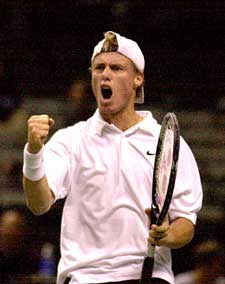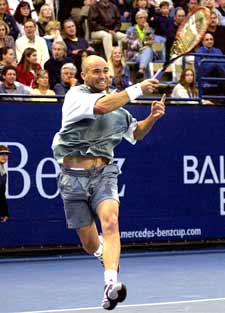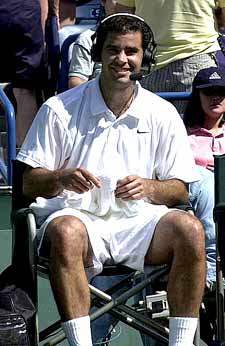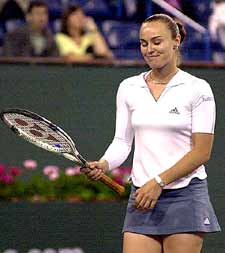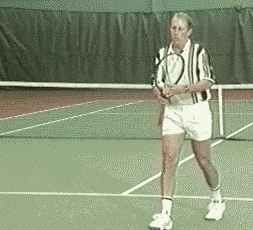The <% ns_puts [mkm_getnavbar] %>
Mental Toughness Training: The Ideal Performance State
|
Playing competitive tennis is at least 50% mental, maybe up to 90% mental in some match situations. That’s what top pros say. Of course, you need technical skills, but in close matches, when players are often physically equal, mental toughness is the determining factor.
As a player, you've probably put significant time into developing and
trying to improve your game. You’ve practiced, invested in new racquets,
and taken lessons. But how much time have you spent developing the mental
skills that are critical to playing your best, loving the competitive
experience, and fulfilling your real potential?
Of the thousands of hours most competitive tennis players devote to the
game, only a fraction are spent developing the mental game.
Players dream of hitting forehands like Andre Agassi or serving like Pete
Sampras. But the most important key to winning--consistent mental
toughness--is within any player's reach.
In this new TennisONE series, we will train you to develop the same mental skills as the top pros to play winning tennis. More importantly, these skills will allow you to enjoy the game and the competitive experience in a way you might not have known possible.
The Ideal Performance State
|
The key to mental toughness is understanding how to create your own
Ideal Performance State. The Ideal Performance State, or IPS, is a highly
specific internal emotional climate that is associated with consistently
high levels of performance. And it can be trained, just a surely as a
topspin forehand.
What exactly does it take to achieve IPS?
It has been well established that top athletes actually play their best
when they are enjoying the game the most, when it is the most fun.
Playing your best tennis should be an almost intoxicating experience,
characterized by great energy, enthusiasm, pleasure, and confidence. There
is a feeling of calm in the center of a storm. Your muscles are relaxed
and your strokes are free and powerful.
Playing your best tennis should feel pressure free. Great players perform
so well in big matches because they literally are not feeling the pressure
the way the average player does.
Early on, my research with elite athletes in many sports showed a direct
correlation between their best performances and these characteristics. The
conclusion? Performance is directly related to how you feel inside. In a
literal sense, emotion runs the show. And learning to create the right
internal mental climate is the key to playing winning tennis.
Time after time I found athletes reported feeling some or all of the following:
|
- Physically Relaxed
- Effortless
- Mentally Calm
- Automatic
- Low Anxiety
- Alert
- Energized
- Mentally Focused
- Optimistic
- Self-Confident
- Enjoyment
- In Control
The top players seem able to create this unique feeling climate on a
regular basis, virtually on demand. Achieving this state of physical,
emotional, and mental balance is the key to success in pro tennis, and
it can become the key to winning tennis for you, too.
What you say, you’ve never felt anything remotely like the
characteristics of IPS in the middle of a tough match? No matter what
you may have heard or believe, mental toughness is not something you are
born with, it’s something you learn.
|
In these training articles, you will learn a series of simple, proven methods that will allow you to create your own Ideal Performance State, to overcome choking, to learn to love the competitive battle, and to play the game with a sense of real fun.
The emphasis is on the word training. It’s not a matter of just
understanding how you should think and feel. It’s a matter of actually
thinking and feeling that way. These articles will present a series of
specific physical and psychological techniques that, when practiced with
discipline over time, will give you the ability to literally shift your
internal chemistry.
Mental toughness is nothing more than this ability to consistently
create IPS, and this state of physical and mental harmony naturally
leads to your best tennis whenever you are on the court.
The result for you will be the same kind of mental toughness we see in the world's best players. The ability to win more matches, to beat the players you want to beat, and enjoy the process of playing competitive tennis.
Over the last 20 years, I have worked with thousands of players, published books and articles, and produced instructional videos. Yet it still amazes me how many players are unaware that these established training techniques can give them the mental and emotional tools to reach their competitive goals.
|
Almost any player from the 3.0 level up can argue the theory of how to hit the forehand or the serve. Most of them are completely unaware of the importance of training the mental dimension.
The 16 Second Cure
As a case in point, the first two articles examine how you spend the
time between points. Most players are unaware that the time between
points actually accounts for the vast majority of time in all
competitive match. They are equally unaware that this between point time
plays a critical role in creating and maintaining the Ideal Performance
State.
We’ll see how you can use the between point times to become the mentally
tough player that you really want to be.
I call this process of learning to use the time between points “The 16
Second Cure.” I’ll present a detailed explanation of how the pros use
this time to stay mentally tough. And then I’ll show you step by step
how you can develop the same ability.
|
I’ll also take the opportunity to respond to some of the criticisms of “The 16 Second Cure” voiced by another TennisONE contributor, Dr. Roland Carlstedt in his article “The 8 Greatest Myth of Sports Psychology.” Stay tuned.
In future articles I'll address the other major elements of the mental game, including the following:
|
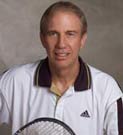 Dr. James Loehr, CEO of LGE Performance Systems, is recognized as a
world pioneer in the field of sports psychology and mental toughness
training.
Dr. James Loehr, CEO of LGE Performance Systems, is recognized as a
world pioneer in the field of sports psychology and mental toughness
training.
He has worked with dozens of elite athletes in Olympic and professional sports, including Grand Slam champions such as Martina Navritilova and Jim Courier.
For more information about training packages for tennis or for the corporate athlete, click here: http://www.corporateathlete.com/index.html
 Pro Secrets of Mental Toughness
Pro Secrets of Mental Toughness
In Pro Secrets of Mental Toughness, Jim Loehr, the world’s leading sports psychologist, trains you to develop the same mental skills used by the world’s top professional players.
Overcome choking, play your best tennis under pressure, become the player you really want to be!
Click here for more info
Last Updated 7/1/02. To contact us, please email to: webmaster@tennisone.com
TennisONE is a registered trademark of TennisONE and SportsWeb ONE; Copyright 1995. All rights reserved.


